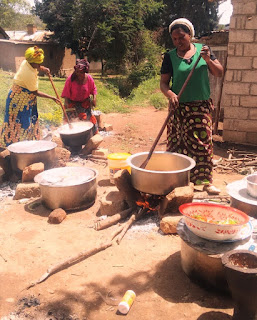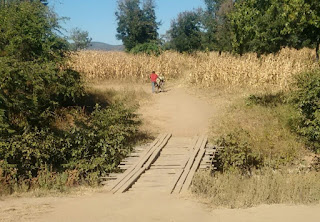A couple of weeks ago the church I attend in Mbeya, Majengo
Baptist, celebrated the induction of a new pastor. After coming back from a
trip, I discovered I had been appointed a member of the organising committee! I cynically assumed I was appointed because I am wealthy (in the eyes of people
here), and all committee members had to contribute money to the costs of the
event. But to be fair, I have never been asked to be on a committee before and
I have attended the church for a good number of years, so although this may
have been a contributing factor, I’m sure it wasn’t the only reason; they probably
just thought it was about time I took my turn!
When I first found out I was on the committee and they
explained about needing to make a contribution, I asked to see the budget so
that I could understand how the costs were being worked out. Most of the budget
was for food. They were anticipating catering for around 300 people! The event
would be held in the new church building (on the same plot of land as the
current church), which at the moment is little more than a roofless shell but
is significantly bigger than our current building, so money was also needed to
hire plastic chairs (to supplement all the wooden pews that were moved there
from the current church) and to decorate the stage area. People were also asked
to bring any tarpaulin they had to create some kind of covering against either
sun or rain (thankfully it didn’t rain). The budget seemed reasonable, except
for the oil. They had included 20 litres of cooking oil! I confess I couldn’t
hold back the nutritionist in me and suggested they reduce it. Lo and behold,
at the next committee meeting (the only one I actually succeeded in attending),
they announced what I had said, agreed to reduce it and joked that I should
teach them how to cook using less oil! I was somewhat embarrassed but it was all
in good fun, and I think they did reduce it a tiny bit as I think they ‘only’
bought 15 litres in the end. The rest of the meeting seemed to be about who
hadn’t paid their contributions yet, whether we should serve chicken to the
important guests and what colour clothes we should wear to show we were the committee members. Like committee meetings the world
over, it seemed to take very long time to achieve very little!
 The day (a Saturday) came and I turned up around 9am to help
with the food prep. I came armed with a chopping board, knife and potato peeler
as I had a hunch they might come in handy, as well as a kanga (local cloth) to
wrap around me for an apron. Other than the fact I was told I shouldn’t use a
kanga that is mostly white when working in the kitchen, I seemed to fit in. I
set to peeling and chopping carrots. A small group of children soon gathered
round me – they all know me as I have taught most of them in Sunday school.
They were fascinated by the peeler and were soon taking it in turns to peel the
carrots while I was busy chopping. They were also fascinated by how fast I
chopped – that’s the benefit of using a board (which I have never seen a
Tanzanian using). We sat outside on some steps as we worked away. The other
helpers seemed to get a kick out of seeing me there, and enjoyed how I was
learning to do things their way.
The day (a Saturday) came and I turned up around 9am to help
with the food prep. I came armed with a chopping board, knife and potato peeler
as I had a hunch they might come in handy, as well as a kanga (local cloth) to
wrap around me for an apron. Other than the fact I was told I shouldn’t use a
kanga that is mostly white when working in the kitchen, I seemed to fit in. I
set to peeling and chopping carrots. A small group of children soon gathered
round me – they all know me as I have taught most of them in Sunday school.
They were fascinated by the peeler and were soon taking it in turns to peel the
carrots while I was busy chopping. They were also fascinated by how fast I
chopped – that’s the benefit of using a board (which I have never seen a
Tanzanian using). We sat outside on some steps as we worked away. The other
helpers seemed to get a kick out of seeing me there, and enjoyed how I was
learning to do things their way.
After the carrots it was peppers. We had some good maths
lessons as we went, as they counted out how many slices of peppers I was
cutting, and then we did some subtraction and a bit of English. Next was a big
basket of tomatoes (at which point I had to move to a shady spot, as I was in
the direct sun and it was strong). Finally I helped grate some ginger (by which
point I had a nice fat blister on my finger). After that there didn’t seem to
be much else I could do, so I wandered over to where the induction service was
in full swing and listened in to a visiting pastor preach for a bit. It was
great to hear him switch briefly into the Nyakyusa language and promote the
Nyakyusa Bible! (This is one of the languages that we are working with – we
hope the New Testament will be published in 2018).
Finally the service was over after much singing and dancing
around the newly inducted pastor and the giving of gifts (of which there seemed
to be a lot, including things like new suits for him to wear). I was assigned
to help serve the important people (the pastors), who ate in the pastor’s office
and the Sunday school room, but I soon realised I wasn’t really needed there,
so I went to help serve the long queue of people outside. There was rice,
cooked bananas, beans, beef and a hot chili sauce and the inevitable sodas. I
had already eaten (I was urged to do so before we started serving, as others
involved in cooking were also doing, otherwise we’d be eating very late after everything
was over). The queue went on and on, I’m sure some people there had essentially
come for a free meal rather than because they cared about the induction
service. The children were all made to wait until last which, on reflection, is
the exact opposite of what seems to happen at celebrations in England!
And then the dish washing began. Piles of plates to wash in
buckets (on the floor, being filled from an outside tap), with an old bit of
sacking as the dishcloth. The plates were very greasy and the water was cold,
so even after washing with lots of soap and rinsing, they still felt greasy! I
helped with this for a while, but it seems that dish-washing is what the
younger girls (teenagers) are supposed to do, so I was able to hand it over,
which is a good job as my back couldn’t take much more bending in awkward
positions! After making sure all the plates had been gathered, it
seemed like there was little more I could do, so I said goodbyes and started to
head off, but before I had got very far one of the ladies asked if she could
borrow my knife and board to cut up a chicken. It turned out there was a whole cooked
chicken left, and some rice, and so now it was the committee members’ turn to
get a treat (i.e. chicken meat) and have a soda.
 It had been a long day and this is a long blog! And I haven’t
even mentioned the smokey wood fires, the massive cooking pots, eating rice
with hands (the rice being so
It had been a long day and this is a long blog! And I haven’t
even mentioned the smokey wood fires, the massive cooking pots, eating rice
with hands (the rice being so
The next day the new pastor thanked me for helping, and told
me people had asked him if I had been born in Africa! Someone else commented
that though I am an ‘mzungu’ on the outside (i.e. I have white skin) I am an
African at heart! While unfortunately this isn’t really true (I am all too
aware of how often I don’t know how to behave in this culture and how different
my thinking can be), I took it as huge complement, and I thank God that in so
many ways I do feel that this is my home and that I am an accepted part of the
church family.
As I reflected on the whole event, I was struck by how on
one level it is just like an induction service in England – with visiting
pastors, lots of guests, a church service, food and a busy team of people in
the background making it all run smoothly. But on another level it was so
totally different, from cooking outside over wooden fires to dancing with gifts
up to the pastor to brightly coloured cloth bedecking the stage to the absolute
necessity of sodas being provided (maybe that’s not so different from the
absolute necessity of a British church providing cups of tea)!
It was certainly an experience I won’t forget, and I pray
that I may continue to serve as part of the body of Christ in Majengo Baptist
Church, as God leads me, despite the deep cultural differences that sometimes
threaten to overwhelm me and make ‘church’ something I sometimes find very hard
to attend. Please pray with me that this church might grow in maturity, that
the new pastor would grow in wisdom, that God’s Word would be taught faithfully
and that as a body we might be “growing
in every way more and more like Christ, who is the head of his body, the church”
(Ephesians 4:15 NLT).





